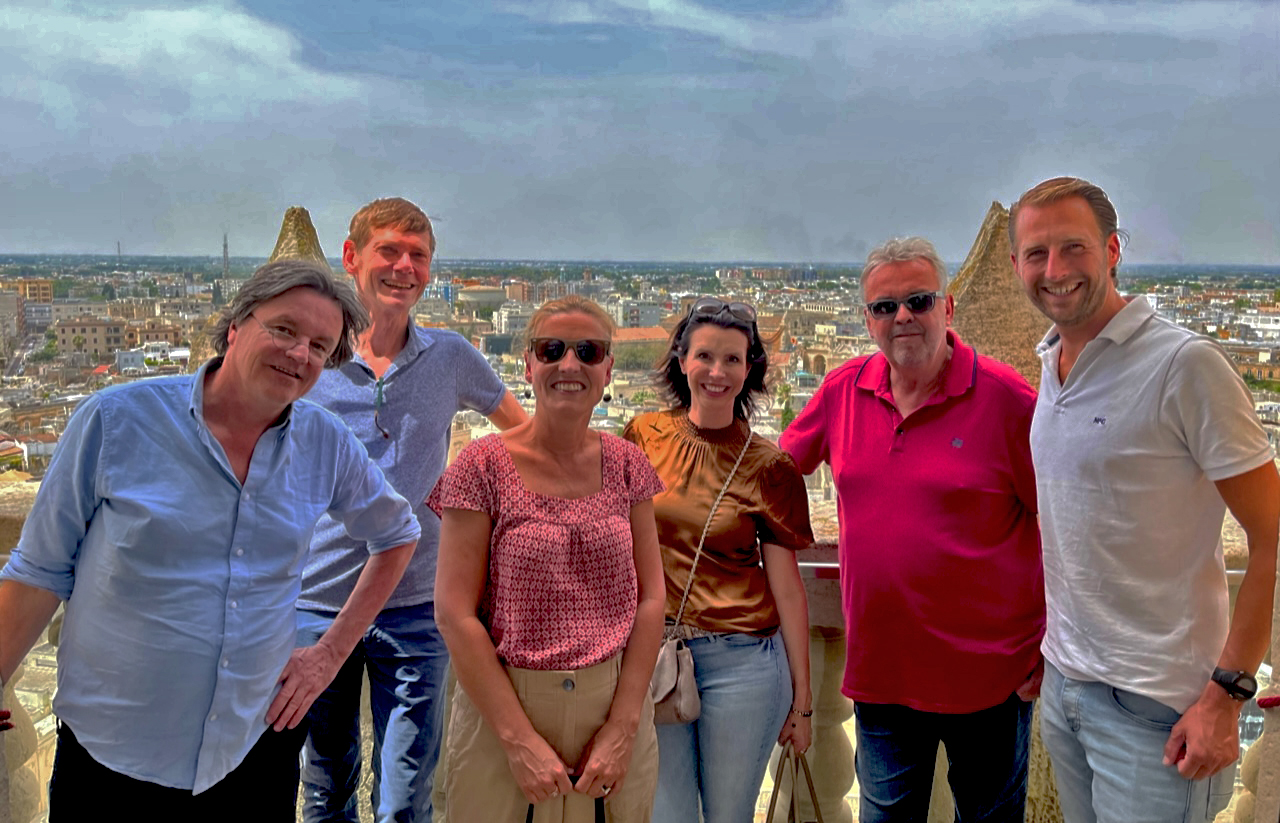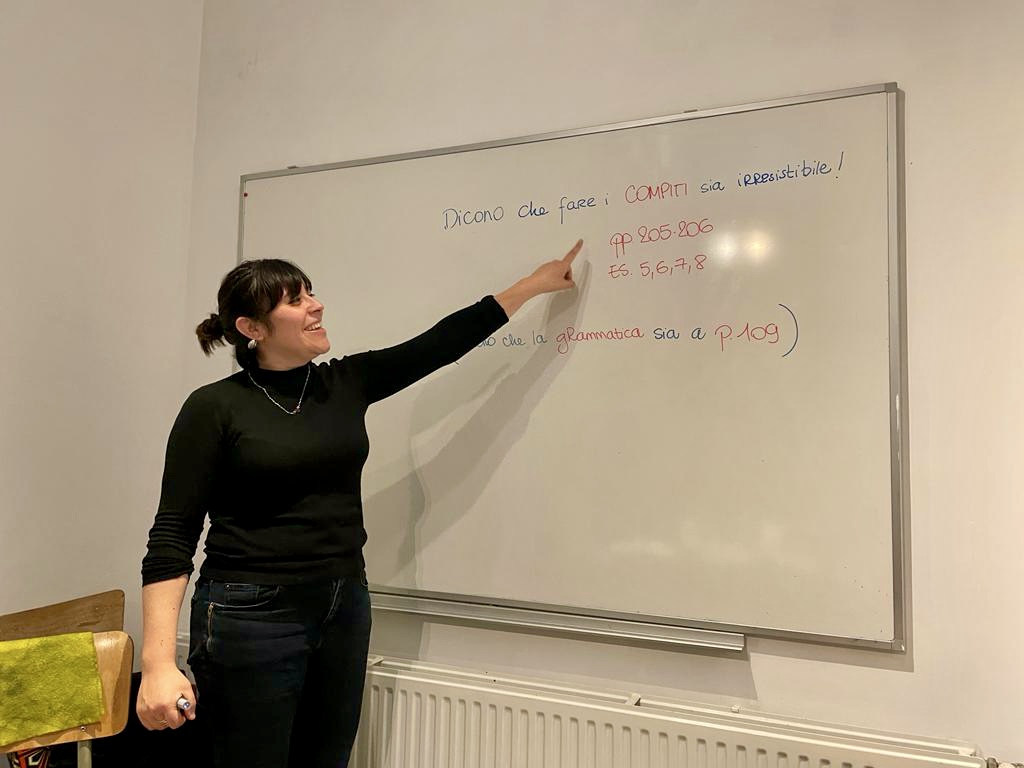Earlier this year we met up with las empollonas, a small group of students who have been taking Spanish with us for years and have now climbed up to C1 level. In the Italian department we have a similar group, called il supergruppo, who had their first class by Francesca Alioto six years ago. They started at Studiolingua, the Italian language school of which Taalhuis Amsterdam has continued its activities since 2018, and four members of the original class still meet every Tuesday evening for their weekly portion of Italian.
The suppergruppo is now at C2 level. After one of their lessons, we spoke to them about their memories of the past years, the trips to Italy they still make every year and the projects they have done at Taalhuis Amsterdam – from visiting the opera to interviewing a Sicilian journalist who specialises in the mafia.
Why did you start learning Italian at the time?
Peter: At university I already had a minor in Italian, but when I also learned Spanish afterwards, that kind of dropped. Later, when I was in Rome, I took a pair of pants to the dry cleaners and wanted to tell them not to fold them. I couldn’t get the words out at all, and that annoyed me so much that I decided to start learning Italian again.
Jan: Do you know how to say it now?
Peter: Senza piega!
Anneliek: I always thought Italian was a beautiful language and often went on holiday there, and at a certain point I started taking lessons.
Machteld: Italy is also my favorite holiday destination, and my best friend is married to an Italian man. I started with my husband with a week of Italian lessons in Rome, and then I continued in the Netherlands, but it was often very schooly and with Dutch teachers. Then I came across Studiolingua through a colleague, with Francesca as a teacher. And that was quite refreshing.
How?
Machteld: Only Italian was spoken and you were expected to take an active part in the lesson, rather than just rattle off grammar rules. I do like a bit of pace, and she really has that. My husband had dropped out in the meantime, but I’m still here. And before you know it, it’s five years later. I didn’t know I’d be staying that long, but you keep thinking: alright, just one year more.
Peter: And at a certain point you also think: now I’ve started doing it, I really want to be able to speak very good.
Machteld: I’m also a grammar nerd. I like doing homework.
Jan: We are quite diligent. When I learned Italian in another place, I found it quite slow. After some googling I ended up here, and I was really shocked in the first lesson. A wildly gesticulating Sicilian who did not speak a word of Dutch, at least not then, and who interacted very directly with everyone.
Anneliek: We’ve done some pretty weird things over the years. We ran, sang.
Peter: Ran to the whiteboard to be the fastest to write down the correct answer.
What do you like about Taalhuis, that you have been there for so long?
Machteld: Students are taught by native speakers, which I think is sublime.
Jan: Yes, that’s a reason for me to stay here.
Peter: Maybe I would like to be corrected more often though. I like to hear it right away when I make a mistake.
Machteld: At this level, I do like to be corrected a bit. But at a lower level I also like it when you are not corrected the entire time; then you dare to talk more. It makes it easier to chat.
Anneliek: It is also an advantage that our group is so small. If there had been eight of us, I think I would have already dropped out.
Machteld: I also like these books; they are in Italian only. When I was a beginner at another school, we had a Dutch-language book, which invited me to speak Dutch in class. That gave me a bit of a high school feeling. That’s also something I learned from Francesca: you should absolutely not directly approach the language from a Dutch perspective. It’s a different language, and you can’t compare the grammar rules one to one.
Speaking of books, you have just interviewed Carlo Guastalla, the author of your book Nuovo Magari C1/C2. What have you learned?
Jan: He did have a nice story about the fact that he can’t just use all the material he wants, because he often has to buy off rights. You cannot use every piece from the newspaper, film fragment or song text in the book. I had never really thought about that.
Peter: Last year we also had an interview with a Sicilian journalist [Francesco Viviano] about the mafia, which we had been preparing for weeks.
Anneliek: The interview with the author was a smaller project – we heard about it a week in advance. We also spent weeks preparing for the opera we went to, Tosca.
Wait, first that interview about the mafia. How did that come about?
Anneliek: That was also a theme in the book. It was you who came up with his name, right Peter?
Peter: Yes. We had a presentation on the mafia and mine was on one of his books.
Machteld: And then it was Francesca’s idea to interview him, via Zoom.
Anneliek: It was very funny, it was an older man and things went a bit wrong in the beginning, the camera was aimed just below his face. But it was a lot of fun.
Machteld: He was very flattered, but he also said that he thought it was a bit exciting beforehand. He had no experience at all with interviews.
What did you get out of this yourself?
Anneliek: It feels extra real when you speak Italian with someone who’s right there. And he just understood us, so that’s a good feeling.
Jan: It doesn’t happen very often that you have such a substantive conversation in Italian. He is also very committed to the subject and has been vulnerable; he had already gotten into trouble once because he had been open about abuses. That also made him emotional. It was a very nice hour.
Machteld: He was also very concerned with refugees who went to Lampedusa. He has also written books about it.
Peter: He also knew many people personally, such as a judge who was murdered. Then suddenly it comes very close.
And whose idea was it to go to the opera?
Anneliek: Peter, he also arranged everything.
Peter: I saw it was coming up and wanted to go there myself anyway. Then I asked if everyone else would like it too.
Jan: We had thoroughly studied it beforehand: the time in which it takes place, but also where the story comes from.
Machteld: It’s really nice to go to the opera when you’re so well prepared. We had already heard the arias in several versions and knew the lyrics, then you get a lot more out of it. Then you really focus on how they do it and with what nuances. I had seen operas before that were quite bombastic, also a bit too much. This was actually quite minimalistic, it came across more subtle.
Anneliek: Much more modern.
Machteld: It seemed as if they had adjusted the libretto a bit. It was an old-fashioned text, but it still made a fresh impression.
Jan: They had modernized the screenplay a bit, yes. It is also a dramatic story, because all the main characters die. That was a bit plastic.
Machteld: But again subtle, it wasn’t too much.
Anneliek: Well, that part with the fingers, and the blood?
Jan: There is also a torture scene in it, but with a wink. Normally it can be quite static, but here it was quite graphic.
Anneliek: We already have tickets for the next opera in December: Turandot, also by Puccini.
As seasoned language learners, do you have any good tips for people who want to learn a new language?
Machteld: I like to read, so I do that a lot. I started with those simple books at A1 level, with definitions of difficult words at the bottom of the page.
Jan: Watching movies, with Italian subtitles. You can also watch RAI Uno on TV with subtitles. That is relatively easy to follow.
Machteld: I also listened to a lot of music – Lucio Battisti, for example, sang very clearly. For me, sentences always stick, or like loose fragments like quanti anni hai?, which is a completely different form than in Dutch. I have also benefited a lot from those apps where you have to repeat something. I turn it on when I’m in the car.
Jan: And listening to the radio, that’s how you get used to the language and it’s easy to hear, even if you don’t understand half of it. At least in the beginning, because later you can just understand it.
Machteld: In the beginning I also watched Friends, spoken and subtitled in Italian. I was able to follow that quite easily, because I already knew a bit about what it was about and it is a fairly simple storyline.
Jan: By the way, I’ll let the others know that we’re a little late.
The others?
Anneliek: We are going to discuss the trip with our travel companions in a moment, because we are almost going to Lecce. It’s our anniversary, the fifth trip already.
Nice tradition! How did that come about?
Machteld: I believe Jan started with it, he is like the capo of the group.
Jan: Back then I wasn’t, haha. Our first trip was a long weekend to Naples. We went there very early on Friday morning, and got back on Sunday evening.
Machteld: We were with eight at the time, I think?
Anneliek: First Naples, then Bari, Bologna, Turin. And now Lecce. And next year Genoa!
Do you have a bit of a fixed division of roles?
Anneliek: Yes, I always seek out the guide, with tours in Italian.
Peter: I like to choose the restaurants.
Machteld: I arrange the taxi bus!
Jan: And I make sure that the trip is booked and everyone does what they have to do.
Machteld: We are also going with four people who are no longer in this group; at a certain point they no longer had time to take lessons, but they still join the school trip.
Their Italian is probably not as good as yours.
Machteld: Well, they’ll get through it with a beer.
Peter: When we got back from Bologna I realized that the only Italian I had spoken was anche per me.
The rest: Hahaha.
Francesca would be proud of you.
Machteld: The first time we looked for an Italian-speaking guide, we had to do our very best. He immediately spoke back in English, so we said: No, we want you to speak in Italian. Then he shouted in surprise to the other guides: this group wants in Italian!
Grazie mille!


